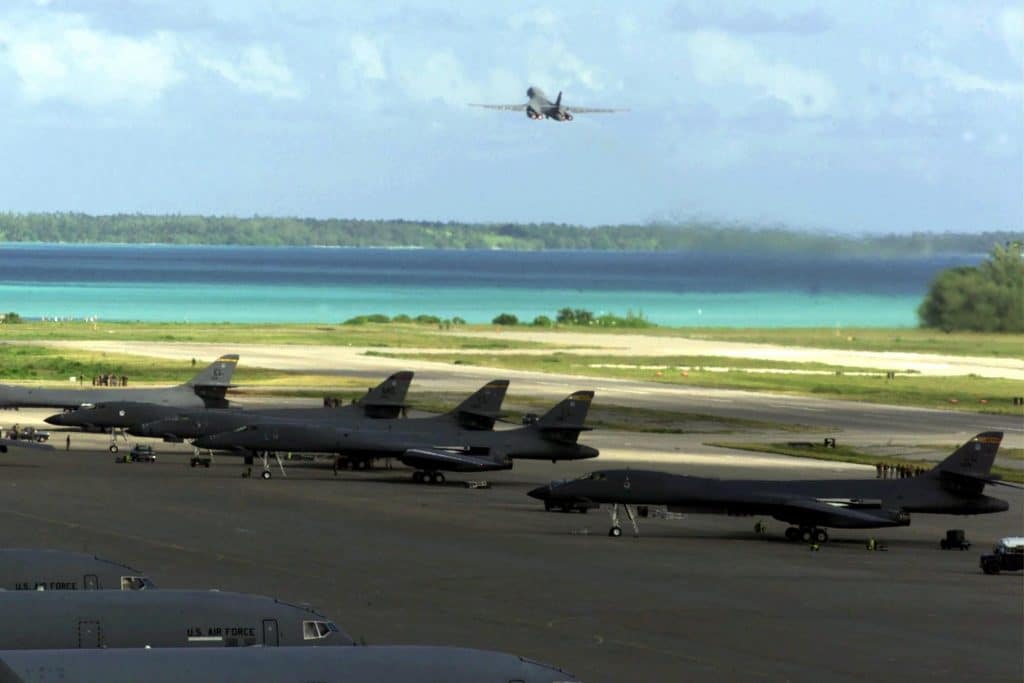The U.S. airbase on the Indian Ocean island of Diego Garcia is among the most crucial and heavily used of the many hundreds of U.S. bases around the world. It has been used extensively in the wars waged by the United States against Iraq and Afghanistan, in the attacks against Syria and Yemen, in the CIA’s torture “rendition” flights, and in a range of other intelligence and military operations.
Diego Garcia is the primary island of the Chagos group, previously dependencies of the British colony of Mauritius. But immediately prior to Mauritius gaining its independence, and as the International Court of Justice at The Hague decided yesterday (February 25, 2019), in violation of international law, the U.K. government separated the Chagos Islands from the colony of Mauritius. The sole purpose was in order to give Diego Garcia to the United States on a long-term lease. The inhabitants were forcibly removed by the U.K., and prevented from returning.
Over the years the former inhabitants in vain sought redress from the British legal system, winning repeatedly in the courts but in the end losing in the House of Lords on, in essence, national security (“royal prerogative”!) grounds.
Of course the real player was the United States, which conspired with its British satellite at every stage of the struggle. At one point, in 2009, the U.S. feared that even the docile Law Lords might permit the islanders-victims of a shameful injustice-to return to some of the islands. The Obama administration and its British puppets came up with a solution: the declaration of an environmental “maritime protected zone” prohibiting any civilian access. A disgusting bit of hypocrisy so very typical of its authors.
But with the ICJ opinion, this play is nearly over. No doubt the U.S. possession of Diego Garcia will not soon end and the Chagos islanders will not soon go home, but the brand of a cruel and blatant violation of international law has been fixed for all time. Great credit goes to the international lawyers who have labored for decades without compensation for the impoverished and exiled islanders, among them Monthly Review Press author Michael Tigar. Credit too goes to the government of Mauritius, which gathered its courage to resist the fierce pressure exerted by the United States to drop its efforts on behalf of the Chagossians. And credit to the fourteen justices of the Hague court, who have reason to be proud of reaching a decision that gives a moment of hope in dark times, and with but one dissent—by the U.S. justice, surprise! —Eds.
Excerpt from the ruling (p. 44-5)
…
- For these reasons, THE COURT,
- Unanimously,
Finds that it has jurisdiction to give the advisory opinion requested;
- By twelve votes to two,
Decides to comply with the request for an advisory opinion;
IN FAVOUR: President Yusuf; Vice-President Xue; Judges Abraham, Bennouna, Cançado Trindade, Gaja, Sebutinde, Bhandari, Robinson, Gevorgian, Salam, Iwasawa;
AGAINST: Judges Tomka, Donoghue;
- By thirteen votes to one,
Is of the opinion that, having regard to international law, the process of decolonization of Mauritius was not lawfully completed when that country acceded to independence in 1968, following the separation of the Chagos Archipelago;
IN FAVOUR: President Yusuf; Vice-President Xue; Judges Tomka, Abraham, Bennouna, Cançado Trindade, Gaja, Sebutinde, Bhandari, Robinson, Gevorgian, Salam, Iwasawa;
AGAINST: Judge Donoghue;
- By thirteen votes to one,
Is of the opinion that the United Kingdom is under an obligation to bring to an end its administration of the Chagos Archipelago as rapidly as possible;
IN FAVOUR: President Yusuf; Vice-President Xue; Judges Tomka, Abraham, Bennouna, Cançado Trindade, Gaja, Sebutinde, Bhandari, Robinson, Gevorgian, Salam, Iwasawa;
AGAINST: Judge Donoghue;
- By thirteen votes to one,
Is of the opinion that all Member States are under an obligation to co-operate with the United Nations in order to complete the decolonization of Mauritius.
IN FAVOUR: President Yusuf; Vice-President Xue; Judges Tomka, Abraham, Bennouna, Cançado Trindade, Gaja, Sebutinde, Bhandari, Robinson, Gevorgian, Salam, Iwasawa;
AGAINST: Judge Donoghue.
Done in French and in English, the French text being authoritative, at the Peace Palace, The Hague, this twenty-fifth day of February, two thousand and nineteen, in two copies, one of which will be placed in the archives of the Court and the other transmitted to the Secretary-General of the United Nations.
(Signed) Abdulqawi Ahmed YUSUF, President.
(Signed) Philippe COUVREUR, Registrar.
…
Read the full ruling: International Court of Justice, February 25, 2019, General List No. 169, “Legal consequences of the separation of the Chagos Archipelago from Mauritius in 1965.”
Read the Press Release from the International Court of Justice: “The Court finds that the process of decolonization of Mauritius was not lawfully completed when that country acceded to independence and that the United Kingdom is under an obligation to bring to an end its administration of the Chagos Archipelago as rapidly as possible.”

